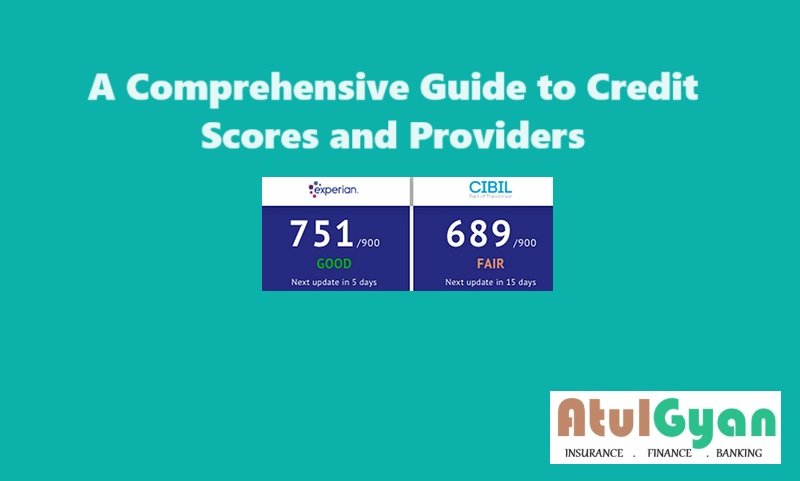A Comprehensive Guide to Credit Scores and Providers
Introduction
Welcome to the world of Indian finance, where understanding your credit score is like having a roadmap to financial success. In this article we provide A Comprehensive Guide to Credit Scores and Providers, we’ll unravel the mysteries surrounding credit scores and the key players in the game – Credit Information Bureau (India) Limited (CIBIL), Equifax, Experian, and CRIF High Mark, known as CICs. Your credit score is more than just a number; it’s a crucial factor that influences your ability to get loans and make significant financial decisions.
We will discuss Importance of Credit Scores, Credit Score Ranges, How to Check Your Credit Score and The Impact of Credit Scores on Loan Approval and other benefits of Credit Score. We will talking about Factors Affecting Credit Scores and Tips for Improvement in this Understanding Credit score guide. Let’s start on a journey to financial empowerment with AtulGyan.com!
Disclaimer: This blog is solely for educational purposes.
Importance of Credit Scores
A credit score is a numerical representation of an individual’s creditworthiness and financial history. It plays a crucial role in various financial decisions and transactions. In this comprehensive guide, we will explore the significance of credit scores and the providers who determine them.
a. Overview of Credit Scores and Their Impact
Credit scores are used by lenders, banks, and other financial institutions to assess the creditworthiness of an individual. A higher credit score indicates a lower credit risk, making it easier to secure loans, obtain favorable interest rates, and access higher credit limits.
b. Influence on Loan Approval, Interest Rates, and Credit Limits
When applying for a loan, lenders consider credit scores as a key factor in determining approval. A higher credit score increases the chances of loan approval, while a lower score may result in rejection or higher interest rates. Credit scores also play a role in determining the credit limit offered by credit card companies.
c. Role in Other Financial Transactions
Aside from loans and credit cards, credit scores also impact other financial transactions. Landlords often check credit scores before renting out a property to ensure the tenant’s financial reliability. Insurance companies may also consider credit scores when determining premiums for auto or home insurance policies.
Credit Score Ranges
a. Explanation of Credit Score Ranges in India
In India, credit scores typically range from 300 to 900. These scores are calculated by credit bureaus based on an individual’s credit history, repayment behavior, and other relevant factors.
b. Different Categories and Their Implications
1. Poor: A credit score below 550 is considered poor. Individuals with poor credit scores may face difficulties in obtaining loans or credit cards. They may also be subject to higher interest rates and stricter terms and conditions.
2. Fair: Credit scores ranging from 550 to 649 fall into the fair category. While individuals with fair credit scores may still be eligible for loans and credit cards, they may face higher interest rates and lower credit limits.
3. Good: Good credit scores range from 650 to 749. Individuals with good credit scores have a higher chance of loan approval, favorable interest rates, and higher credit limits.
4. Very Good: Credit scores between 750 and 849 are classified as very good. Individuals with very good credit scores enjoy better loan terms, lower interest rates, and higher credit limits.
5. Excellent: An excellent credit score falls within the range of 850 to 900. Individuals with excellent credit scores have the best chances of loan approval, the lowest interest rates, and the highest credit limits.
Understanding credit score ranges is essential for individuals to assess their financial standing and make informed decisions regarding loans, credit cards, and other financial transactions.
Credit Score Providers in India: Credit Information Companies (CICs)
When it comes to financial transactions, credit scores play a crucial role in determining an individual’s creditworthiness. In India, there are several Credit Information Companies (CICs) that provide credit scores and reports to lenders, individuals, and businesses. These CICs collect and maintain credit information of individuals and generate credit scores based on their credit history. In this article, we will discuss four major Credit Information Companies in India: Credit Information Bureau (India) Limited (CIBIL), Equifax Credit Information Services, Experian Credit Information Company of India, and CRIF High Mark Credit Information Services.
Credit Information Bureau (India) Limited (CIBIL)
Credit Information Bureau (India) Limited, commonly known as CIBIL, is one of the most well-known and widely used credit information companies in India. Established in 2000, CIBIL collects credit-related data from various financial institutions and generates credit reports and scores for individuals and businesses. CIBIL scores range from 300 to 900, with a higher score indicating a better credit profile. Lenders often rely on CIBIL scores to assess the creditworthiness of loan applicants.
Equifax Credit Information Services
Equifax Credit Information Services is a global credit information company that operates in India as well. Equifax collects and maintains credit data from various sources, including banks, NBFCs (Non-Banking Financial Companies), and other financial institutions. It provides credit reports and scores to lenders, individuals, and businesses. Equifax scores range from 300 to 900, similar to CIBIL scores. The company also offers value-added services like fraud detection and identity verification.
Experian Credit Information Company of India
Experian Credit Information Company of India is another major player in the credit information industry. Experian collects credit data from banks, NBFCs, telecom companies, and other sources to generate credit reports and scores. The credit scores provided by Experian range from 300 to 900, just like CIBIL and Equifax. In addition to credit scores, Experian also offers services like portfolio management, risk assessment, and fraud prevention to its clients.
CRIF High Mark Credit Information Services
CRIF High Mark Credit Information Services is a relatively newer entrant in the Indian credit information market. It provides credit reports and scores to lenders, individuals, and businesses. CRIF High Mark collects credit data from banks, NBFCs, credit card companies, and other financial institutions. The credit scores generated by CRIF High Mark range from 300 to 900, similar to other CICs. The company also offers analytics and consulting services to its clients.
It is important to note that while these four CICs are the major players in the Indian credit information industry, there are other smaller CICs as well. These companies also provide credit reports and scores based on their own credit data collection and analysis methodologies.
Having a good credit score is essential for individuals and businesses to access credit facilities at favorable terms. It is advisable for individuals to regularly check their credit scores and reports from these CICs to ensure accuracy and take necessary steps to improve their credit profile if needed.
How to Check Your Credit Score
Step-by-step guide on obtaining a credit report from various providers
Checking your credit score is an important step in managing your financial health. Here is a step-by-step guide on how to obtain a credit report from various providers:
- Start by choosing a credit reporting agency. There are several reputable agencies to choose from, such as Equifax, Experian, CRIF and TransUnion- CIBIL.
- Visit the website of your chosen agency and look for the section dedicated to obtaining a credit report.
- Provide the necessary personal information, such as your name, address, social security number, and date of birth.
- Verify your identity by answering a series of security questions. These questions are designed to ensure that only you have access to your credit report.
- Once your identity is verified, you will be able to view and download your credit report.
Alternative Way: You can request a credit score by your bank and other financial app. These service provider credit score and details on your demand. It will be easy because you are familiar with bank and other finance bank. Almost all bank provide this service and fintech and financial service companies also. But it can be both free and paid. Therefore, make your request after knowing about the charges in advance.
For Example an App One Score provide details and Credit Score without any cost. Nowadays we are using many Fintech app like Paytm, Gpay, Phonepe, AmazonPay etc. These fintech provide credit score without any cost also.
Importance of regularly monitoring your credit score
Regularly monitoring your credit score is crucial for several reasons:
- It allows you to keep track of your financial health and identify any potential issues or discrepancies.
- Monitoring your credit score can help you detect any unauthorized activity or identity theft.
- By staying informed about your credit score, you can take proactive steps to improve it over time.
Addressing discrepancies in credit reports
If you come across any discrepancies in your credit report, it’s important to take action:
- Contact the credit reporting agency to report the error and provide any supporting documentation.
- Follow up with the agency to ensure that the discrepancy is investigated and resolved.
- If necessary, reach out to the creditor or lender associated with the error to rectify the situation.
- Regularly check your credit report to ensure that the discrepancy has been corrected.
Checking your credit score and monitoring your credit report are essential steps in maintaining your financial well-being. By following these steps and addressing any discrepancies, you can stay on top of your credit and make informed financial decisions.
Factors Affecting Credit Scores and Tips for Improvement
Factors Affecting Credit Scores
A credit score is a numerical representation of an individual’s creditworthiness and is used by lenders to determine the risk of extending credit. Several factors influence credit scores:
- Payment history: Timely payments and a history of paying bills on time positively impact credit scores.
- Credit utilization: The amount of credit used compared to the total credit available affects credit scores. Keeping credit utilization low is beneficial.
- Length of credit history: A longer credit history demonstrates responsible credit management and can positively impact credit scores.
- Types of credit in use: Having a mix of credit types, such as credit cards, loans, and mortgages, can positively impact credit scores.
- New credit accounts: Opening multiple new credit accounts within a short period may negatively impact credit scores.
Tips for Improving Credit Scores
If you are looking to improve your credit scores, consider the following tips:
- Responsible financial behavior: Practice responsible financial habits, such as making payments on time, managing credit wisely, and avoiding excessive debt.
- Reducing outstanding debt: Develop strategies to pay down outstanding debt, such as creating a budget, prioritizing high-interest debt, and exploring debt consolidation options.
- Importance of timely payments: Make timely payments on all credit accounts, as late payments can negatively impact credit scores.
By understanding the factors that affect credit scores and implementing these tips for improvement, individuals can work towards building a strong credit history and improving their creditworthiness.
The Impact of Credit Scores on Loan Approval
When it comes to securing a loan, credit scores play a crucial role in the approval process. Lenders rely on credit scores to assess the creditworthiness of borrowers and determine the risk associated with lending them money. Understanding how credit scores affect loan approval can help individuals make informed financial decisions.
Role of Credit Scores in Securing Different Types of Loans
Credit scores have a significant impact on the ability to secure various types of loans, including home loans, personal loans, car loans, and more. For example, when applying for a home loan, lenders consider credit scores to evaluate the borrower’s ability to make timely mortgage payments. A higher credit score often leads to more favorable loan terms, such as lower interest rates and higher loan amounts.
Similarly, when applying for personal loans or car loans, credit scores are used to determine the borrower’s creditworthiness. Lenders assess the likelihood of timely repayments based on the credit history reflected in the credit score. A good credit score increases the chances of loan approval and may result in better loan terms.
How Lenders Interpret Credit Scores during the Loan Approval Process
Lenders interpret credit scores as a measure of an individual’s creditworthiness and financial responsibility. A higher credit score indicates a lower risk of defaulting on loan payments, making the borrower more attractive to lenders. On the other hand, a lower credit score may lead to higher interest rates or even loan denial.
During the loan approval process, lenders typically set minimum credit score requirements for each type of loan. These requirements vary depending on the lender’s risk tolerance and the specific loan product. Lenders also consider other factors, such as income, employment history, and debt-to-income ratio, in conjunction with credit scores to assess the borrower’s overall financial situation.
In conclusion, credit scores have a significant impact on loan approval. They play a vital role in securing different types of loans and are used by lenders to evaluate a borrower’s creditworthiness. Understanding the role of credit scores can help individuals improve their financial standing and increase their chances of loan approval.
Credit Score: Your Gateway to Seamless Credit Card Approval
Securing a credit card hinges on your credit score, a numerical reflection of your creditworthiness. Higher credit scores enhance approval prospects, leading to better terms, including lower interest rates and higher credit limits. To ensure a smooth journey in the credit card realm, maintaining a healthy credit score through timely payments and responsible credit management is paramount. Your credit score is not just a number; it’s the passport to financial opportunities and flexibility.
We know that Salaried persons get credit card easily by the banking and financial institutions or who has a proper fixed income source and proofs. But initial or beginner Gig Worker Face the struggle. Banks and NBFCs Provide lot of solutions. W e already discuss this an article: Credit Cards for Gig Economy Workers. In that guide we discuss in detail about Gig Economy, Gig worker and Solutions for individuals that related this industry.




